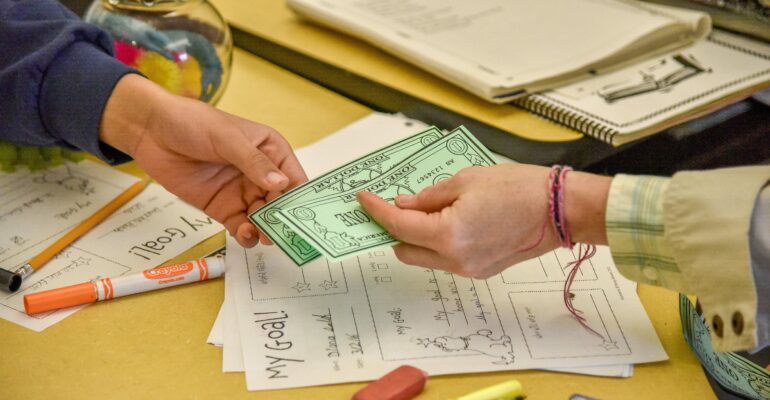By Beth Brod
Children rarely have much power over their lives. They are told what time to get up, what to eat for breakfast, who their teachers are, what classes they must attend, and so on. This can be especially true for students in special education who often struggle in school, and receive even more academic and behavioral instruction. When a special education student has experienced trauma—hunger, homelessness, violence—the loss of control a student feels over even the simplest part of a school day can be exacerbated.
But at the school where I teach, children in special education are empowered to thrive. They are the ones in enviable positions getting to leave their classrooms for small group sessions in the learning center where they learn to be kind, listen to others, follow routines, and otherwise “do their jobs.” These messages motivate students to self-actualize, and they are succeeding with learning tools that help them think critically and persevere when the going gets tough.
So, how do we help students feels more confident in taking control of their lives?
The answer is simple: When students are allowed to make choices, they begin to have power.
In my classroom, I use The Shadow Project’s motivational Goal Setting program to help kids realize and use their power in making decisions over schoolwork and behavior. The Shadow Project provides resources and incentives so that our students can do their jobs with more confidence and feel the value of a task well done.
Here are 3 ways The Shadow Project helps me empower my students:
1. Setting goals
When students set goals for themselves, they are able to see they have a say in their own path forward. They aren’t being told where they must make gains, they are guided towards goals. They are given power in choosing their goals. They are listened to and their opinions are valued. When students’ ideas and opinions are valued, they are empowered.
2. Rewarding work
Not all kids get a paycheck for the work they do! Our learning center students who do their job and act like respectful, responsible students get Shadow Bucks (classroom money) just like an adult might earn a paycheck. If students don’t engage in learning in a way supportive to our community, they don’t earn Shadow Bucks like their peers. Students keep their Shadow Bucks in envelopes (we sometimes call them wallets) and periodically get to count their Bucks and can decide to trade up for bigger bills, which is motivating as the Bucks accumulate, as well as good for math skills.
3. Celebrating
It is important to take notice of kids’ progress and accomplishments, particularly those with learning disabilities whose progress may be incrementally smaller, and who aren’t always recognized for their efforts. So, every six weeks we have Shadow Day. In order to participate in Shadow Day, our students are expected to have a strong work ethic with community-minded behavior to match. This doesn’t mean that they need to be perfect. This just means that when our students make mistakes, they are motivated to set goals and improve where needed so that they can achieve their goals and participate in the celebration.
Shadow Day is a top secret event only for our kids in special education. They know not to talk about it with their peers, because it is a privilege, and we don’t want other students to feel bad that they are not included. This secret celebration makes them feel special and in charge of their destiny. Older students get to help choose the Shadow Day date. Then, we post the date in the classroom so that the date is known by all our students who need to know.
On Shadow Day—like a payday for adults—students are empowered to spend their “paycheck” in whatever way they choose with their Bucks. They can select gifts, school supplies, books, sensory tools, art supplies, and more. Being able to spend one’s own paycheck as one chooses is empowering. Where else can young children living in a lower-income community have the power to earn and purchase?
Providing Purpose
Empowering kids with special needs through goal setting, earning Shadow Bucks, and celebrating Shadow Day gives meaning to students’ lives. As Viktor Frankl writes in Man’s Search for Meaning, “Life is never made unbearable by circumstances, but only by lack of meaning and purpose.” When my kids feel that they are spending their days at school with a purpose they are more motivated to show up and work hard. Our students’ purpose is supported by their kind, caring teachers … and by The Shadow Project.
Beth Brod is a longtime special education
teacher in Portland, Oregon, currently based at Woodmere Elementary School.


Comments are closed.